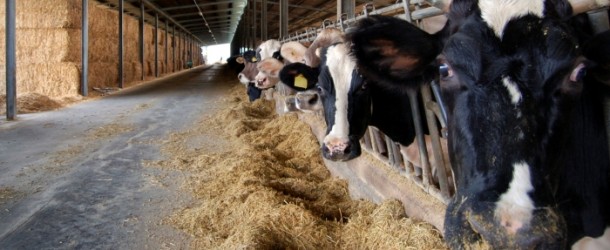EarthTalk®
E – The Environmental Magazine
Dear EarthTalk: We’ve been hearing for years how producing red meat is bad for the environment while consuming it is bad for our health. How do other types of meat, fish, dairy and vegetable proteins stack up in terms of environmental and health impacts? –– Julia Saperstein, via e-mail
Not all forms of protein are created equal as to the environmental and health implications of raising and consuming them. A 2011 assessment by the non-profit Environmental Working Group (EWG) found that “different meats and different production systems have varying health, climate and other environmental impacts.”
The quantity of chemical fertilizers, fuel and other “production inputs” used, the differences in soil conditions and production systems and the extent to which best practices such as cover cropping, intensive grazing or manure management are implemented all affect the amount of greenhouse gas emissions a meat product is responsible for generating. To wit, lamb, beef, cheese, pork and farmed salmon raised “conventionally” (e.g. with inputs including hormones and antibiotics and feed derived from crops grown with chemical pesticides and fertilizers) were determined by EWG to generate the most greenhouse gases.
EWG partnered with the environmental analysis firm CleanMetrics to assess the climate impacts via lifecycle assessments of 20 popular types of meat, fish, dairy and vegetable proteins. EWG’s assessment calculated the full “cradle-to-grave” carbon footprint of each food item based on the greenhouse gas emissions generated before and after it left the farm—from the pesticides and fertilizer used to grow animal feed all the way through the grazing, animal raising, processing, transportation, cooking and even disposal of unused food (since some 20 percent of edible meat gets thrown away by Americans).
According to EWG, conventionally raised lamb, beef, cheese and pork also generate more polluting waste, pound for pound. Of these, lamb has the greatest impact, followed by beef and then by cheese—so vegetarians who eat dairy aren’t off the hook. “Beef has more than twice the emissions of pork, nearly four times more than chicken and more than 13 times as much as vegetable proteins such as beans, lentils and tofu,” summarizes EWG.
On the health front, EWG reports that “eating too much of these greenhouse gas-intensive meats boosts exposure to toxins and increases the risk of a wide variety of serious health problems, including heart disease, certain cancers, obesity and, in some studies, diabetes.”
Besides cutting out animal-derived proteins altogether, the best thing we can do for our health and the environment is to cut down on our meat consumption. “While best management practices can demonstrably reduce overall emissions and environmental harm, the most effective and efficient way to reduce greenhouse gas emissions and environmental impacts from livestock is simply to eat, waste and produce less meat and dairy.” For more information, check out EWG’s free online “Meat Eater’s Guide.”
CONTACTS: EWG Meat Eater’s Guide, www.ewg.org/meateatersguide.
EarthTalk® is written and edited by Roddy Scheer and Doug Moss and is a registered trademark of E – The Environmental Magazine (www.emagazine.com). Send questions to: earthtalk@emagazine.com. Subscribe: www.emagazine.com/subscribe. Free Trial Issue: www.emagazine.com/trial.
Photo Credit – iStock Photo

[…] The Environmental Impact of Meat – Chic Vegan […]